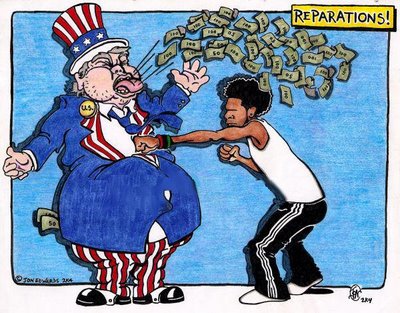Black Scholar Says ‘Black Votes Should Count More Than Whites’
Theodore Roosevelt Johnson III is an opinion columnist, speaker, 2011-2012 White House Fellow, and military officer, who writes and speaks on issues of race and politics. He holds a Bachelor of Science degree in Mathematics from Hampton University and a Master’s degree with an International Relations concentration from Harvard University. In 2014, he began doctoral studies at Northeastern University.
In a recent column Mr. Johnson argued for padding the black vote. He argues that Blacks should get “weighted votes so they ‘count for 167 percent of everyone else’s.’” He bases this percentage on the three-fifths clause in the Constitution. “A five-thirds compromise would imbue African Americans with a larger political voice that could be used to fight the structural discrimination expressed in housing, education, criminal justice and employment.”
Here’s what Johnson is really saying: “Blacks should get a higher calculated percentage of a vote so they can use the political system to take money from mostly white people.”
Am I exaggerating?
“A five-thirds compromise would imbue African Americans with a larger political voice that could be used to fight the structural discrimination expressed in housing, education, criminal justice and employment. Allowing black votes to count for 167 percent of everyone else’s would mean that 30 million African American votes would count as 50 million, substituting super-votes for the implausible idea of cash payments.”
 Let’s look at a few basics in dealing with some of Mr. Johnson’s points. First, Johnson’s use of “three-fifths” clause as a basis for his argument of an inflated vote for blacks is confused. As a Harvard graduate, Mr. Johnson should know that the three-fifths clause was designed to weaken southern voting strength. The Northern states did not want to count slaves when it came to empowering the House of Representatives which is based on population size. The larger the population, the more representatives, the more representatives, the more votes a state would get. Compare Rhode Island (2) to California (53).
Let’s look at a few basics in dealing with some of Mr. Johnson’s points. First, Johnson’s use of “three-fifths” clause as a basis for his argument of an inflated vote for blacks is confused. As a Harvard graduate, Mr. Johnson should know that the three-fifths clause was designed to weaken southern voting strength. The Northern states did not want to count slaves when it came to empowering the House of Representatives which is based on population size. The larger the population, the more representatives, the more representatives, the more votes a state would get. Compare Rhode Island (2) to California (53).
The Southern states hoped to include slaves in the population statistics so as to acquire additional representation in Congress. The compromise was to count slaves as “three-fifths” of a person for representation purposes.
The goal of the Northern delegates was to dilute Southern voting strength so as to outlaw slavery by constitutional means. “The struggle that took place in the convention was between the Southern delegates trying to strengthen the constitutional supports for slavery and the Northern delegates trying to weaken them.” ((Robert A. Goldwin, “Why Blacks, Women & Jews Are Not Mentioned in the Constitution,” Commentary (May 1987), 29.))
If none of the slaves had been included in the population count for representation, as Northern delegates wanted, the slave states would have had only 41 percent of the seats in the House. If all the slaves had been included, as Southerners wanted, the slave states would have had 50 percent of the seats. By agreeing to count slaves as three-fifths of a person for representation purposes, the Southern slaveholding states ended up with a minority voting position — 47 percent. Robert L. Goldwin concludes:
“[T]he point is that the ‘three-fifths clause’ had nothing at all to do with measuring the human worth of blacks. Northern delegates did not want black slaves included, not because they thought them unworthy of being counted, but because they wanted to weaken the slaveholding power in Congress. Southern delegates wanted every slave to count ‘equally with the Whites,’ not because they wanted to proclaim that black slaves were human beings on an equal footing with free white persons, but because they wanted to increase the pro-slavery voting power in Congress. The humanity of blacks was not the subject of the three-fifths clause; voting power in Congress was the subject.” ((Goldwin, “Why Blacks, Women & Jews Are Not Mentioned in the Constitution,” 30.))

Second, there are millions of people who had nothing to do with slavery. My grandparents were born in Italy and immigrated to the United States in the early part of the 20th century. Why should the descendants of my grandparents be forced to pay reparations for something they did not do?
Third, trillions of dollars have been paid to blacks (and whites) for decades through wealth transfer in the form of subsidies. This was a moral wrong that has only hurt blacks and the poor generally. Additional wealth transfer payments would do even more harm.
Fourth, who gets to determine who’s black? What if I “self-identify” as black? What if a person doesn’t have the necessary “government documents”? What if a person is not fully black? Does he or she get a different percentage?
Fifth, what does Mr. Johnson think would happen if his call for more theft from people who have not done any harm to blacks took place? Can anyone say ‘race war’?



